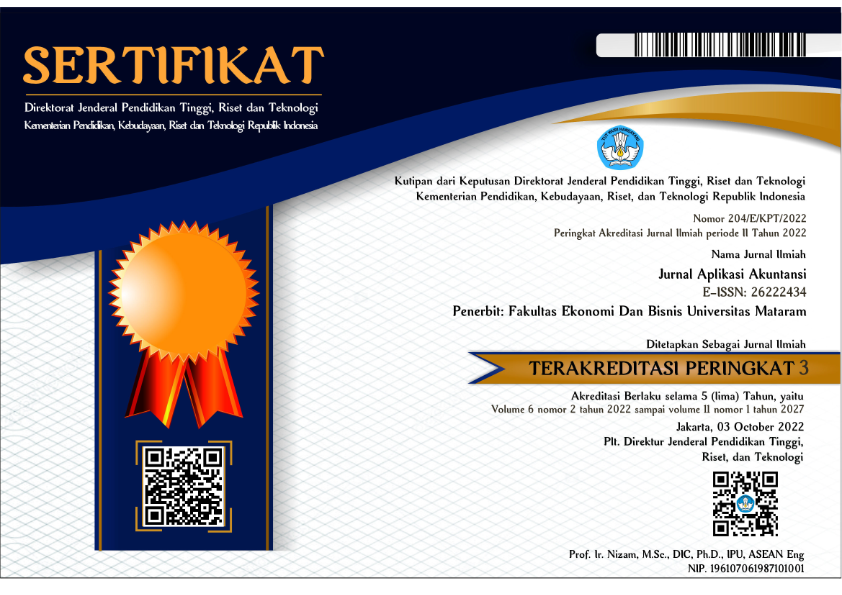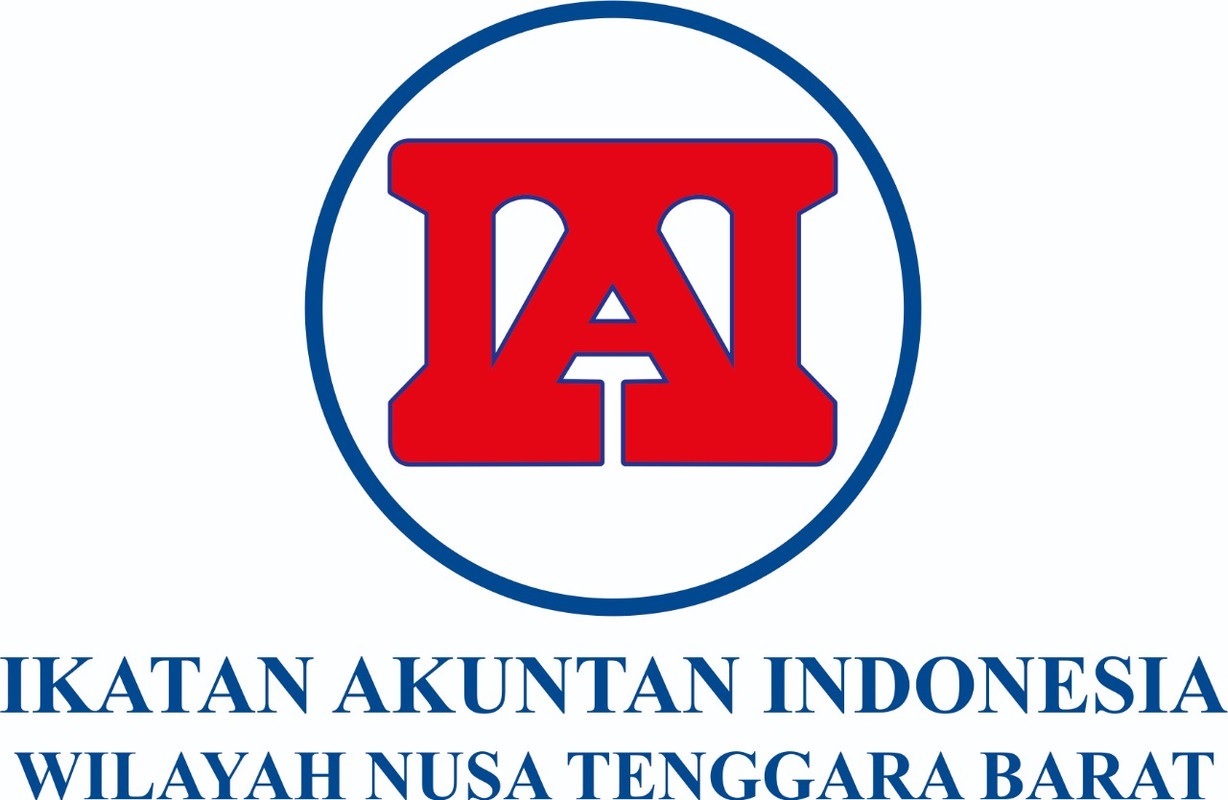IDENTIFIKASI FRAUD HEXAGON THEORY DAN PARTISIPASI MASYARAKAT DESA DALAM MEMITIGASI RISIKO FRAUD PENGELOLAAN DANA DESA
DOI:
https://doi.org/10.29303/jaa.v8i2.364Keywords:
fraud, fraud hexagon, village fundAbstract
This study aims to identify the impact of pressure, rationalization, and potential collusion on the risk of fraud in managing village funds, where the main obstacles faced are the lack of community participation and low human resources. Community participation is considered an essential form of transparency and accountability in managing village funds in the hope of preventing fraud. This research is a quantitative study designed in the form of a survey. The research population includes villages in the Cibalong Sub-district area, and the area sampling technique of six villages was used. This research used the Structural Equation Modeling Partial Least Squares (SEM PLS) method. The results showed that the elements in the fraud hexagon model, such as pressure, rationalization, and potential collusion, did not significantly impact the risk of fraud in managing village funds. In addition, the findings also show that community participation does not have a significant effect in reducing the likelihood of fraud in the management of village funds. The implications of this research encourage an improved understanding of village fund management practices to reduce the risk of fraud and increase village community participation.
References
Agustin, C.R., and Achyani, F. 2022. “Pengaruh Dimensi Fraud hexagon Terhadap Academic Fraud.” Prosiding National Seminar on Accounting, Finance, and Economics (NSAFE) 2(1): 295–309.
Aprilia, A. (2017). Analisis pengaruh fraud pentagon terhadap kecurangan laporan keuangan menggunakan beneish model pada perusahaan yang menerapkan Asean corporate governance scorecard. Jurnal ASET (Akuntansi Riset), 9(1), 101-132. https://doi.org/10.17509/jaset.v9i1.5259
Babulu, N. L. (2020). Faktor-Faktor Yang Mempengaruhi Akuntabilitas Dalam Pengelolaan Dana Desa dan Dampaknya Terhadap Pencegahan Fraud. Juni, 5(2), 18–26. http://jurnal.unimor.ac.id/JEP18
Desa Kabupaten Tasikmalaya, Retrieved from https://tasikmalayakab.bps.go.id/indicator/153/109/1/jumlah-desa-per-kecamatan-di kabupaten-tasikmalaya.html
Desviana, Basri, Y.M., Nasrizal. (2020). Analisis Kecurangan pada Pengelolaan Dana Desa. Studi Akuntansi dan Keuangan Indonesia, 1-24.
Gede, I Made, D.P., Dewi, Nyoman Ayu, W.T. 2022. “Pengaruh Elemen Fraud hexagon Terhadap Kecurangan Akuntansi Pada Badan Usaha Milik Desa Di Kabupaten Buleleng.” 12(2): 339–53.
Graen, G. B., & Uhl-Bien, M. (1995). Relationship-based approach to leadership: Development of leadermember exchange (LMX) theory of leadership over 25 years: Applying a multi-level multi-domain perspective. The Leadership Quarterly, 6(2), 219–247.
Gunanti, R. (2023). Analisis Pengaruh Elemen Fraud hexagon Terhadap Kecurangan Dana Desa Dengan Religiusitas Sebagai Variabel Pemoderasi (Studi Pada Pekon Way Suluh Kecamatan Krui Selatan Kabupaten Pesisir Barat) [UIN Raden Intan Lampung.]. http://repository.radenintan.ac.id/29142/
Hairul, T. (2022). Analisis Peran Inspektorat Dalam Pencegahan Fraud Pada Pengelolaan Keuangan Desa. 1-24.
Jensen, M.C., and Meckling, W.H. 1976. “Theory of the Firm: Managerial Behavior, Agency Costs and Ownership Structure.” Corporate Governance: Values, Ethics and Leadership: 77–132.
Kinicki, A., & Fugate, M. (2013). Organizational behavior : key concepts, skills & best practices (5th ed.). New York: McGraw-Hill Education.
Monahan, K. (2013). What do values have to do with it?: An exploration into the moderating impact of work values on the relationship between leader-member-exchange and work satisfaction. Academy of Strategic Management Journal, 12(1),
Muslim, I. W. (2022). Diduga Tidak Transparan Terkait Pembangunan Gor Desa, Warga Cisempur Protes. Ayotasik.Com. https://www.ayotasik.com/berita tasik/pr-334090502/diduga-tidak-transparan-terkait-pembangunan-gor-desa-warga cisempur-protes.
Pahlawan, E. W., Wijayanti, A., & Suhendro, S. (2020). Pengaruh kompetensi aparatur desa, sistem pengendalian internal, pemanfaatan teknologi informasi dan partisipasi masyarakat terhadap akuntabilitas pengelolaan dana desa. Indonesia Accounting Journal, 2(2), 162. https://doi.org/10.32400/iaj.29261
Penyaluran Dana Desa Kecamatan Cibalong, Retrieved from https://sid.kemendesa.go.id/village-fund
Peraturan Pemerintah Republik Indonesia Nomor 45 Tahun 2017 tentang Partisipasi Masyarakat dalam Penyelenggaraan Pemerintahan Daerah, Retrieved from https://peraturan.bpk.go.id/Home/Details/64699/pp-no-45-tahun-2017
Permana, D. (2023) “Efektivitas Pengelolaan Dana Desa Di Desa Cisempur Kecamatan Cibalong Kabupaten Taikmalaya”. Jurnal Ilmiah Koordinasi 1(2).
Rahmah, N.A., Pratiwi, L., Rismayani, G. (2021). “Analisis Pengelolaan Dana Desa Dan Prioritas Penggunaan Dana Desa Terhadap Kesejahteraan Masyarakat Desa Sindangkasih Di Era Pandemi Covid-19.” Jurnal Ekonomi Perjuangan 3(2): 55–67.
Rahmi, F., Asrinaldi, Putri, I.A. 2022. “Partisipasi Masyarakat Dalam Pengelolaan Dana Desa: Kasus Di Kabupaten Lima Puluh Kota, Provinsi Sumatera Barat.” Jurnal PolGov 3(2): 163–201.
Safitri, R. (2022). "Analisis Penyalahgunaan Alokasi Dana Desa". Jurnal Petitum, 1-11.
Sagala, S.G., Siagian, V. (2021). “Pengaruh Fraud hexagon Model Terhadap Fraudulent Laporan Keuangan Pada Perusahaan Sub Sektor Makanan Dan Minuman Yang Terdaftar Di BEI Tahun 2016-2019.” Jurnal Akuntansi 13(2): 245–59
Selvia, D. E., & Arza, F. I. (2023). Pengaruh Transparansi, Asimetri Informasi, dan Partisipasi Masyarakat terhadap Potensi Kecurangan Dana Desa. Jurnal Eksplorasi Akuntansi, 5(3), 1206–1223. https://doi.org/10.24036/jea.v5i3.707
Seputro, H.Y., Wahyuningsih, S.D. and Sunrowiyati, S. (2017) ‘Potensi Fraud Dan Strategi Anti Fraud Pengelolaan Keuangan Desa’, Jurnal Penelitian Teori & Terapan Akuntansi (PETA), 2(1), pp. 79–93. doi: 10.51289/peta.v2i1.284.
Setyono, D., Hariyanto, E., Wahyuni, S., Pratama, B. S. (2023). “Penggunaan Fraud hexagon Dalam Mendeteksi Kecurangan Laporan Keuangan.” Owner: Riset dan Jurnal Akuntansi 7(2): 1036–48.
Suryandari, E., Pratama, L. V. (2021). “Determinan Fraud Dana Desa: Pengujian Elemen Fraud hexagon, Machiavellian, Dan Love of Money.” Reviu Akuntansi dan Bisnis Indonesia 5(1): 55–78..
Ulum, S., Suryani, D. A., (2021). “ Partisipasi Masyarakat Dalam Pengembangan Desa Wisata Gamplong”. Jurnal Manajemen Publik & Kebijakan Publik 3(1): 14-24
Undang-Undang Nomor 6 Tahun 2014 Tentang Desa, Retrieved from https://jdih.kemenkeu.go.id/fulltext/2014/6TAHUN2014UU.htm
Vousinas, G.L. (2019). Advancing theory of fraud: The S.C.O.R.E. model. Journal of Financial Crime, 26(1), 372-381. https://doi.org/10.1108/jfc-12-2017-0128
Wiguna, I Made, A., Atmadja, A.T., Yuniarta, G.A. (2022). “Fraud Dalam Pengelolaan Keuangan Desa Adat.” Jurnal Ilmiah Akuntansi dan Humanika, Vol. 12 No. 3 ISSN: 2599-2651 12(3): 547–58.
Downloads
Published
How to Cite
Issue
Section
License
Copyright (c) 2024 Gista Rismayani, Wawan Sukmana, Yeni Fitriani Somantri, Yona Rida Sundari, Virdha Firdaus Suhaya, Fahmi Fauzan Suganda

This work is licensed under a Creative Commons Attribution-NonCommercial-ShareAlike 4.0 International License.









